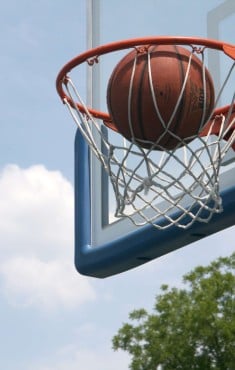Table of Contents
The reality is that there is no single answer. Each child develops at his or her own pace, and the most important thing is to enjoy the process without feeling pressured. However, experts agree that there are key ages at which learning is most effective.
If your child shows an interest in basketball, knowing when and how to start can make all the difference in his development. What is the best age to start? Is it too late if he starts after the age of 10? How can training sessions help his progress?
Below, we will answer all these questions.
what is the best age to start basketball?
There is no exact age for a child to start basketball, but many coaches agree that between the ages of 5 and 9 is the ideal time. At this age, children improve their coordination, balance and body control, which makes it easier for them to adapt to the movements of the game. However, each child is different. The important thing is that the process is progressive, adapted to their development and, above all, that they enjoy learning.
Let’s see how training changes according to age:
From 5 to 6 years old: learning by playing
At this age, basketball should be pure fun. They work on coordination, balance and motor skills, without worrying about rules or complex techniques.
Lower hoops and adapted balls allow children to gain confidence and become familiar with basic movements: bouncing, shooting and passing the ball.
From 7 to 8 years old: first rules and team play
Here they begin to understand basic concepts of the game, such as moving around the court and collaborating with their teammates. They can also improve their coordination and make more accurate shots.
Some children’s teams begin to play friendly games with adapted rules, but the focus remains on learning and fun.
From the age of 9: technique and strategy
With more strength, control and agility, children can incorporate official rules, tactical plays and more structured training.
If a child starts at this age, there is still time to develop his talent without disadvantage. With the right practice, they can improve quickly and reach a competitive level.
what if a child starts later?
It is common for some children to discover their passion for basketball after the age of 10. At this age, many parents worry that it is too late for their child to reach a good level. The answer is no.
While starting young can help with coordination and familiarity with the sport, talent and effort play a bigger role than starting age.
Many players have started later than usual and still managed to develop great skill on the court.
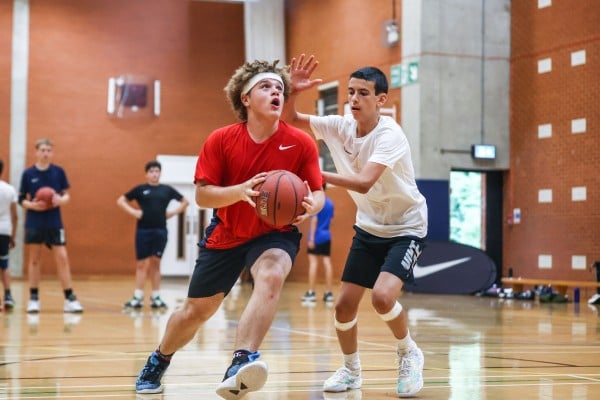
Advantages of starting basketball after age 10
If a child starts playing basketball at the age of 10, 12 or even 14, he or she has some advantages compared to younger players:
- Greater ability to understand. He can learn rules and tactics faster than a 5 or 6 year old.
- More advanced physical development. He has more strength and control over his body, which facilitates certain movements.
- Greater motivation and focus. If he decides to play at this age, it is because he is really interested, which can translate into greater commitment.
what are the challenges?
While starting late doesn’t prevent you from learning to play well, it does present some challenges:
- Coordinating more complex movements. Children who have played from a young age tend to have automated certain technical gestures.
- Adapting to the pace of play. If other teammates are more experienced, it may be harder to keep up at first.
- Avoid frustration. It is normal that at the beginning there are differences in level with those who have been playing for a longer time.
how to improve quickly?
The key to reach a good level in a short time is practice and perseverance. Here are some tips:
- Structured training. Classes or camps with specialized coaches can accelerate learning.
- Extra work off the court. Practicing bouncing, passing and shooting at home or on a nearby court helps improve technique.
- Focus on attitude and effort. Confidence and discipline are key to closing the gap with more experienced players.
Regardless of age, basketball is a sport that rewards dedication. With the right coaching, any child can improve and enjoy the game.
Benefits of basketball in child development
Basketball is more than just a sport. For children, it can become a powerful tool for physical, mental and social development. Through the game, they learn skills that benefit them on and off the court.
But that’s not all. Basketball improves coordination, endurance and concentration, in addition to fostering values such as teamwork and discipline.
According to a study published by the International Basketball Federation (FIBA), playing from an early age boosts children’s physical, mental and social development, strengthening fundamental motor and cognitive skills.
Of course, there are more benefits. Here we detail them:
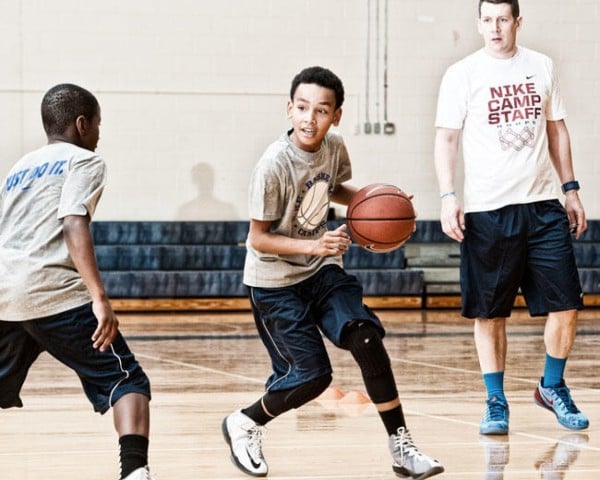
Physical development: strength, speed and coordination
Playing basketball from an early age contributes to physical development in many aspects:
- Improves motor coordination: Controlling the ball while running, passing and shooting requires a high level of coordination between eyes, hands and feet.
- Strengthens muscles and bones: Constant activity helps develop endurance, strength and balance, reducing the risk of future injury.
- Increases agility and speed: Quick changes of direction and the need to react quickly improve a child’s ability to move.
- Improves cardiovascular endurance: Running back and forth on the court keeps the heart active and in good condition.
Mental and emotional growth
Playing basketball from an early age contributes to physical development in many ways:
- Improves motor coordination: controlling the ball while running, passing and shooting requires a high level of eye, hand and foot coordination. As children practice, these movements become more natural and precise.
- Strengthens muscles and bones: According to the American Academy of Pediatrics, impact sports like basketball contribute to better bone development in childhood, which prevents joint problems in adulthood.
- Increases agility and speed: Rapid changes of direction and the need to react quickly improve a child’s ability to move, which is essential for performance in other sports and physical activities.
- Improves cardiovascular endurance: Running from one side of the court to the other keeps the heart active and in good shape. Basketball is a high-intensity sport that promotes aerobic endurance, helping children stay in good physical shape.
Social Skills: Beyond Sports
Basketball teaches values that children will carry with them throughout their lives:
- Teamwork: learning to play with teammates, sharing the ball and seeking collective rather than individual success.
- Respect for rules and authority: Following rules, respecting referees and coaches fosters discipline and respect.
- Managing frustration: Learning to lose with dignity and pick yourself up after mistakes is a key life skill.
- Forming friendships: Sharing practices, games and tournaments creates lasting friendships.
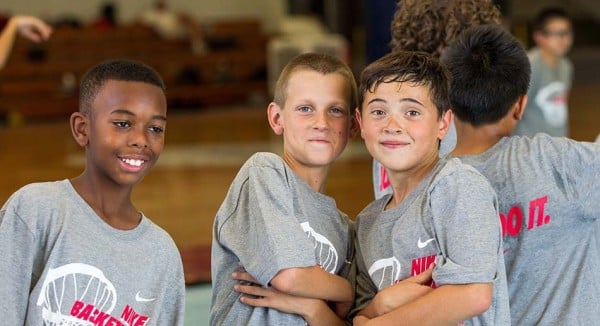
Basketball is much more than putting the ball in the basket. It is a sport that molds character, teaches values and helps children grow in a balanced way.
The role of parents in their children’s athletic initiation
When a child shows an interest in basketball, parental support can make the difference between a positive experience or a road full of frustrations.
It’s not just a matter of signing him up for a team or buying him a ball. The accompaniment, motivation and attitude of the family play a key role in his sports development.
Encourage interest without pressure
Many children like basketball, but not all of them want to play it competitively. Some see it as a recreational activity, while others dream of improving and going far.
It is important to respect their pace and level of commitment. Forcing them to play or demanding too much from a young age can generate rejection and cause them to abandon the sport before they reach their potential.
Instead of focusing on results, it is best to value effort, fun and personal improvement. If a child enjoys every practice and game, he or she will be more likely to stick with the sport in the long run.
Create healthy habits
Basketball doesn’t just involve practices and games, it also requires habits that enhance a child’s performance and well-being:
- Balanced nutrition. A nutrient-rich diet promotes energy and physical development.
- Adequate rest. Sleeping well is essential for recovery and growth.
- Physical activity routine. Beyond training, it is advisable to encourage an active lifestyle.
Motivate without generating stress
It is normal to want children to improve, but there is a big difference between motivating and pressuring. Some parents demand so much that basketball stops being fun and becomes a source of stress.
Instead of focusing on mistakes, it’s better to highlight progress and effort. A simple “I saw you try really hard today” or “you’re handling the ball better and better” has a much more positive impact than criticizing a missed play.
Basketball should be a space where the child feels comfortable, motivated and supported. Their athletic development will be much better if they play with passion and not out of obligation.
Basketball camps: an opportunity for improvement and enjoyment
For children who are passionate about basketball, a camp can be one of the best experiences to boost their development. Not only does it allow them to improve their technique with specialized coaches, but it also immerses them in a motivating environment where they can learn, compete and make friends with the same passion.
why choose a basketball camp?
Camps are not just intensive training sessions. They are spaces designed for learning, fun and personal growth. Some of the benefits include:
- Improve individual technique: Coaches work on key fundamentals such as shooting, rebounding and defense.
- Develop team play: Tactics, positioning and decision-making in real game situations are taught.
- Build confidence: The learning environment allows children to feel more confident in their abilities.
- Meet high-level players and coaches: In some camps, participants receive advice from professionals with experience in national and international leagues.
- Unforgettable experience: Beyond sports, children enjoy recreational activities and create bonds with peers from different parts of the world.
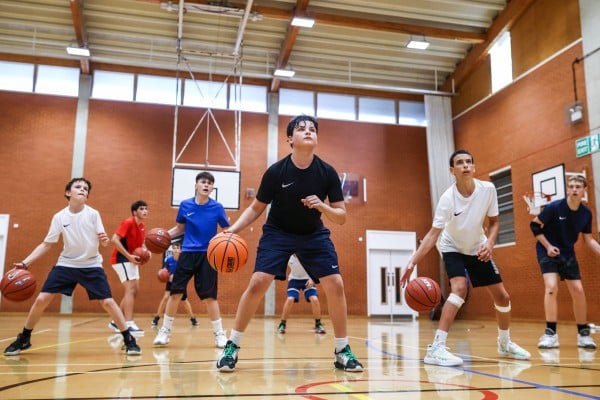
Ertheo’s basketball camps
At Ertheo, we offer high-performance basketball camps for children and youth who want to take their game to the next level. We have programs in Spain, the United States and England, tailored to different ages and skill levels.
Our camps include:
- Training with professional coaches: Sessions focused on improving technique and physical performance.
- Matches and competitions: Opportunities to apply what you learn in real-life confrontations.
- Personal development and winning mentality: Discipline, resilience and teamwork are encouraged.
- International environment: Children and youth from different countries share their passion for basketball in an enriching environment.
For parents looking for a complete experience that combines sport, education and fun, Ertheo camps are an ideal choice.
Conclusion: A good start makes all the difference
The age at which a child starts playing basketball can influence his or her development, but the most important thing is that he or she enjoys the process. It’s not just about learning to shoot baskets, but about building skills that will serve them on and off the court.
If your child has an interest in basketball, giving them access to proper training and a motivating environment is key.
For those looking to take their game to the next level, Ertheo’ s basketball camps are a great opportunity. There, players improve their technique, learn from expert coaches and grow both on and off the court.If you want to learn more about our programs and find the best one for your child, contact us. The next big step in their athletic journey can start here.

